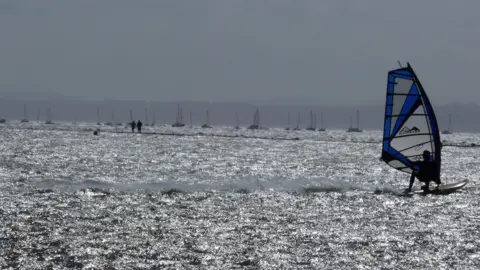Beach clearance may have breached law - watchdog
 Peter Craine/Geograph
Peter Craine/GeographThe clearance of vegetation on part of a coastal beach may have failed to comply with environmental law, a watchdog has said.
Work to return the beach to "golden sands" was carried out at West Kirby beach on Merseyside in May, after it was approved by government body Natural England.
The Office for Environmental Protection (OEP) watchdog said rare species such as natterjack toads and various plants "should have been considered".
A spokesman for Natural England said it was working with the watchdog's review regarding the removal of saltmarsh habitat, adding that they would "continue to provide reassurance that environmental law is complied with, now and in the future”.
Wirral Council said a habitat regulation assessment had been carried out before the clearance.
A spokesman for the local authority added: “We will, of course, take time to fully consider the requirements set out in the decision by the Office of Environmental Protection and will respond to them in due course.”
Wirral Council previously said that raking of the beach stopped during the coronavirus pandemic, leading to an increase in vegetation, which is considered by environmental experts to boost the presence of rare species.
But Natural England approved the vegetation clearance between 20 and 30 May this year, which involved removing common cordgrass and common saltmarsh-grass from 0.5 hectares (1.2 acres) on the beach.
It cost the council £34,631, a Freedom of Information request revealed.
Shortly after the work had been carried out the council said: "West Kirby benefits from both a natural and amenity beach - these, alongside the Marine Lake and Hilbre Islands, support the tourist trade."
Liverpool-based ecologist Joshua Styles, who registered a complaint with the OEP, told the BBC the Dee Estuary, which includes West Kirby beach, hosted "supremely rare" habitats which became vulnerable when fragmented.
"It doesn't take long to go extinct when a tractor runs through an area - raked beaches don't give protection," he said.

In a letter responding to Mr Styles' complaint, the OEP watchdog said Natural England “may have failed to comply with environmental law” when it did not consider the combined effect of giving assent for May’s clearance and providing consultation advice to Wirral Council - which has a beach management plan indicating potential future removal of saltmarsh habitat.
The OEP said this “would prevent the habitat from regenerating over time”.
The watchdog said it would not be conducting further investigation but it would monitor future actions.
Mr Styles said a sandy section of the beach had been available for people to use before the vegetation was cleared, adding: “It just meant you had to walk 10 metres further down."
“It’s not a legitimate argument to destroy a globally-important conservation area,” he said.
"It’s not ‘nature or people’, it's ‘nature and people’."
Listen to the best of BBC Radio Merseyside on Sounds and follow BBC Merseyside on Facebook, X, and Instagram. You can also send story ideas to [email protected]
